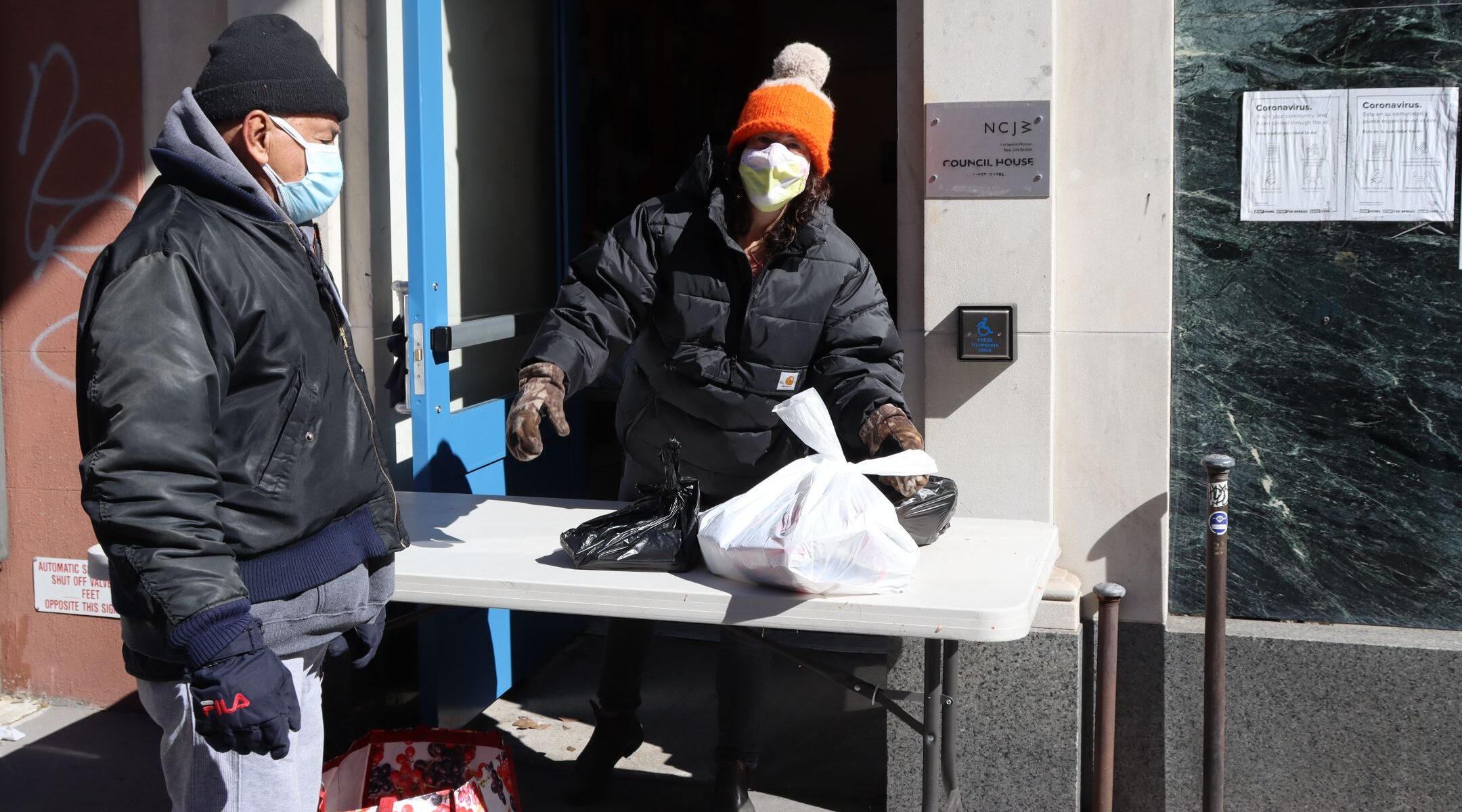This story is part of “One Year In,” a series documenting the ways that the COVID-19 pandemic has changed the lives of Jews around the world.
(JTA) — For years, Andrea Kopel’s Mondays included working with more than a dozen volunteers, all older women living on the Upper West Side of Manhattan, to distribute food to hungry New Yorkers.

Then came COVID-19, and more New Yorkers than ever struggled to pay for food — but the volunteers disappeared. Not only were they following public health guidance for anyone who could to stay home, but they were especially susceptible to the risks of the coronavirus.
“The women who sat at the registration table were an average age of 89 — and that’s average,” Kopel said.
Kopel is the executive director of the New York chapter of the National Council of Jewish Women, which has run a food pantry, delivering three to four days’ worth of food to hungry families every Monday since the 1980s, when the Reagan administration cut back nutrition programs for the poor.
That mission became all the more pressing when the pandemic set in, as many people lost jobs or access to food at work and school. Hunger became a national crisis. And Kopel had to figure out how to meet local needs without the 15 to 20 reliable volunteers who had been recruited from the constituency that her group serves with activities such as meditation, exercise and craftwork.
The abrupt change required an acceleration of shifts that were already underway. When she started at NCJW in 2014, the nonprofit veteran Kopel said, “We were doing check-in and registration with paper files that the volunteers kept in a milk crate.”
She launched Excel and computer training for the volunteers. She won’t say how successful it was.
“Computer savvy?” she said, laughing. “They’re computer-game. You can quote me on that and that’s all I’m going to say.”
Then the pandemic hit and there was no way Kopel could keep her elderly volunteers in place. “They all had to go home and stay there, even if they didn’t want to,” she said. “Some of them wanted to keep coming in but we said this is not responsible.”
Kopel and her staff scrambled to meet the challenge, and didn’t miss a Monday of food distribution, she said. They found replacement volunteers among younger New Yorkers who were seeking a way to fill the scads of time suddenly available to them.
But much the heart had been drained of the Monday food pantries. Before the pandemic, recipients and volunteers would sit down to chat during registration sessions that started each pickup. They’d go over which items a recipient needed and which had to be avoided because of allergies — and they would connect on a human level.
Now, volunteers swiftly hand over a pre-packaged bag.
“We have really prided ourselves on really creating a warm and welcoming and dignified experience for our hunger program,” Kopel said. “This does not feel like that at all.”
The loss is not felt just by the volunteers, she said; the clients also got a lot out of the old ways of engaging.
“They really want us to know that they appreciate that we’re here for them. They really want to say thank you and God bless you,” Kopel said. “They want to tell us their story. Some people want to tell us that they’ve always been independent before and they’ve never needed help. They want to know how we’re doing. They want to say ‘Are you okay, how are you?’ They really want to know — and those are just not conversations we can have.”
Still, even with limited time for emotional interactions, a new cadre of younger volunteers are growing as addicted to the work as their elderly predecessors have been, Kopel said.
“One of our [younger] volunteers told us that it is the most meaningful and satisfying thing in her life right now,” she said. “A lot of our younger volunteers will probably need to go back to some extent to their office jobs or sales, a lot of those will have less flexibility. But there may be a shift. One thing that will change is that we may become a bit more intergenerational.
“I do think that for a lot of people in the past year has really, it’s been in a positive way of sort of a moment of reckoning,” she said. “And really, wanting to give back but in a more robust or meaningful way.”
But while Kopel said she anticipates a more diverse set of volunteers in the future, she expects the old guard to return once it is safe for them to do so.
“The Upper West Side is a hotbed of aging New Yorkers,” she said. “I run into folks on the street and sometimes I talk to them on the phone and, yes, they all want to come back.”
The New York Jewish Week brings you the stories behind the headlines, keeping you connected to Jewish life in New York. Help sustain the reporting you trust by donating today.





